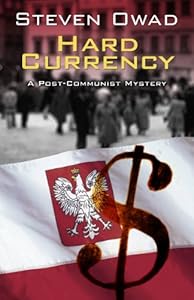Hard Currency
by Steven Owad
Opening sentence:
Between the train station and the shoe factory stood reminders of why Julian
had brought Krystyna here: a butcher shop without meat; a line of people
outside a bakery that wouldn’t open for an hour; bottles in gutters; listless
men lolling on park benches, the morning hours grinding by in slow motion.
This is the ‘before’ of Poland – in 1983,
still in the grip of Communism – a brief, evocative scene establishing both the
repressive political climate and Julian Krol’s love for his little sister. A
few pages and nine years later, Poland
is celebrating its post-Solidarnos economic and political freedom, and Julian
has lost touch with Krystyna. When told she is dead, an apparent suicide, he cannot
reconcile what he hears about her tawdry life in prostitution with the
intelligent, ambitious girl she had been. Setting out to learn how she came to
that end, he stirs up an unexpected hornet’s nest of political corruption and
economic game-playing that threatens him and everyone he comes in contact with.
Julian draws on his
journalistic resources to trace a translation job Krystyna was doing on the
side, one that required her knowledge of languages and dialects stretching all
the way to Pakistan.
His determination to discover who was behind that job attracts the attention of both the official police and ugly enforcers from several criminal classes. Interspersed with the present action are Julian’s
memories of Krystyna, of his political agitation that got her flagged by the
State as a potential enemy, of their final parting of the ways three years
earlier. By the time the reader has all that history in place, the present is a
grim one indeed for Julian and several associates of both his and Krystyna’s.
The rest of the novel is an almost McInnes-like scramble through hills and
towns, even underground, to avoid harm and reach the truth.
Landscapes and city
streets come to life with equal strength. Characters, whether heroic or
villainous or occasionally both, are well drawn, deeply credible in their roles
and in their movement through the tumultuous post-Communist country as it
struggles to find its feet. This author lived and worked in Poland during
the early years of freedom from Communism, and paints a vivid picture of the
old, the new, and the old wearing a new Armani suit.
Hard Currency
by Steven Owad
Published by Gale FiveStar


No comments:
Post a Comment